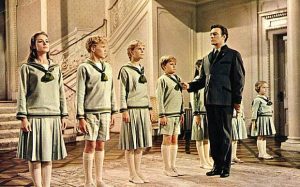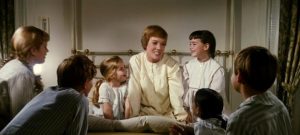I’m sure that you can think of countless films that draw upon World War II and the fight against fascism. The Nazis are a recognizable evil against whom protagonist can fight. And while this fighting normally presents itself in the form of combat or military action, The Sound of Music comes at it with a different approach. As the name implies, The Sound of Music relies on song and dance to work through its problems. But then the question becomes, how can something so gentle as singing overcome the evil of fascism?

Let’s start with the obvious: in the film, the Nazis try to force Captain Von Trapp to take a place in their military forces, but he refuses and manages to evade their demands by escaping from the country. This is effectively defying the Nazi forces that are overtaking the rest of the nation. The foundation of this escape, though, is the Von Trapps’ performance at the folk festival. Had they not had the excuse of singing in the festival, the captain would have been taken away immediately to fulfill his duties. In contrast to the success of this plan, which was all about singing, their original plan, which involved sneaking out quietly, was a complete failure. This distinction of singing having a positive outcome and silence having a negative one communicates the idea that song will save you.
Possibly more impactful than their actual escape though, is their defiance of the Nazis in the performance itself. Despite Herr Zeller saying that the family was singing “only because that is the way [he] wants it to be”, he is visibly unhappy that they are performing. And Edelweiss, which Captain Von Trapp performs, is not just any song, but is meant to evoke feelings of love for the old Austria, that is, one which is not under control of the Nazis. In this way, not only is the very act of them being there an unhappy sight for the Nazis, but the song being performed is outright bad taste in their view.
One particular moment of interest in this song is when the Captain, singing alone, chokes up, presumably because he is either so sad that the nation he knows and loves has been lost, or fearful that he won’t be able to escape and will have to submit to the Nazis. Either way, he is visibly overwhelmed by the outcomes of the Nazis’ actions. But Maria steps in to sing along with him, and they get not only the children to join in, but also the entire audience (excluding of course the Nazi leaders). Here, the performers and the observers become one and have joined together to sing a song that disregards the Anschluss and temporarily unites everyone into the non-fascist nation that they previously were. Maria joining in allows the Captain to rebel against the threat of the Nazis just as the unification of the audience and the Von Trapps allows everyone in the theater to temporarily break free from the hold of the Nazis. It is through the collective effort of ordinary people that they are able to rebel.
But it is no secret in the film that the Von Trapps were rebelling against the Nazis. What is subtler is the fascism, which is ultimately destroyed through singing, that exists within the family itself. When Maria shows up, the family embodies a fascist regime. As Raymond Knapp describes, it is “run by an autocratic, militaristic captain blind to the individual needs of his own children”. But Maria’s arrival changes all of that. It is through teaching the children how to sing that she is able to help liberate them from their unhappy life under the demands of their authoritarian father.

The first thing she does is ensure that they are all on the same level. She does not demand that the children see her as their superior. Right off the bat she tells Liesel that she will just be her friend if she would like. And when the thunderstorm strikes, they all climb into Maria’s bed together and sing. When they are sitting in the bed, they are physically all at the same eye level and act as though they are all friends. It is in this first song, “My Favorite Things”, that Maria establishes a collectivity and begins to tear down the fascism that this family is drowning in. The children get a taste of what it is like to play and they recognize for the first time how freeing music is. Maria is teaching them that through singing they can overcome their fears and get through tough situations.

And she isn’t just teaching the children this, she is telling the viewers as well. It is nearly impossible, at least for me and those I have watched it with, to see this scene and not want to sing along too. It makes the viewer feel like they can be a part of it and it allows them to be temporarily freed from their own anxieties and fears. The songs in this movie make those watching want to be “active participants and not merely observers” (Flinn). In this way, everything that is happening in the film is more directly influencing us because we are so tightly drawn in through the music. The music liberates both us and the children. When Maria teaches them to sing, she is giving them a tool that they can use to break the ranks as soldiers in the house and just be kids, while at the same time teaching us to similarly deal with our own problems.
But they aren’t just singing and playing, they are singing and playing in bad taste. This bad taste largely originates from Maria. Everything about her reeks of it. As a nun, she is constantly late and doing things she shouldn’t. An entire song is dedicated to a debate about her disobedience. As a governess, she stands up to the Captain within the first few minutes of meeting him and criticizes the way he runs his family. Considering that this was the 1930s, this would have been particularly poor taste, as it is a low-class woman condemning an elite naval officer. She couldn’t care less what other people think about her actions. She sings “I have confidence in me”, demonstrating that it is through songs that she has the courage to rebel against her superiors.
Similarly, once the children begin to sing, they act in fits of liberating bad taste. Not only are they wearing clothes made from curtains, an idea that is absolutely appalling to the Captain, but they also act in ways that aren’t conducive to their regimented lifestyle. When the Captain drives by kids hanging in trees, oblivious that they are his own, he states that they are “just some local urchins”. By urchins he means mischievous, raggedy children, i.e. kids who he thinks are acting in bad taste. From this it becomes clear that singing liberates you to act in ways that defy your superiors and disregard the social norms that they value. In fact, in one scene, Maria doesn’t just rebel against the captain, she switches roles with him entirely. When Maria again acts in bad taste and argues with the Captain about his relationship with his children, he actually calls her “Captain” by mistake. It is clear that he didn’t mean to say it, but interestingly he never takes it back.

And right after they have this argument, he goes in and sings with his kids for the first time in many years. This act of singing together is a pivotal moment for the structure of the family, for when the song is finished, the Captain hugs all of his children. The embrace is something that was inconceivable only a little while before and altogether destroys the fascist environment of the house. It would not have been possible though, had the song not acted as the means of overturning the relations within the household.
Thus, just as song is used to rebel against the Nazis, it is used to rebel against the fascism within the Von Trapp family. To clarify though, the film is not trying to convey that fascist regimes can be completely toppled by everyone singing and dancing through fields. Instead, it is saying that fascism on the individual level can be overcome through song. A person or group of people can push out the fascist within them or individually defy greater fascist powers. Maybe, just as with the crowd at the festival, song can even allow an entire crowd to temporarily revolt against fascism. What’s more, if this is true with fascist ideas, the same can just as easily apply to all forms of evil. The film, by drawing the viewers in through song, is providing you with the tools to overcome any demon in your life, at least temporarily. And these tools don’t require you to be high class, wealthy, or well educated. If you can sing and have confidence in confidence alone, The Sound of Music argues that you can overcome anything.